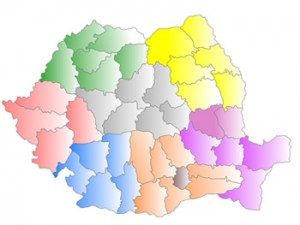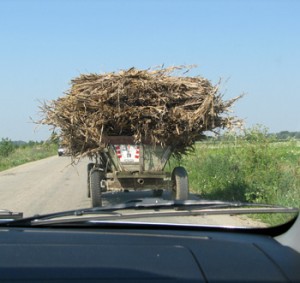 After staying in Romania for some six month now I am thinking of writing down some experiences from my stay abroad and to share my insights with you. But let me start with a short introduction to Romania and its history. Where is Romania? Is it a real state or rather a state of emergency? What are the Romanians like? And how did I got here? All this questions are to be answered first and the answers might be surprizing….
After staying in Romania for some six month now I am thinking of writing down some experiences from my stay abroad and to share my insights with you. But let me start with a short introduction to Romania and its history. Where is Romania? Is it a real state or rather a state of emergency? What are the Romanians like? And how did I got here? All this questions are to be answered first and the answers might be surprizing…. First of all, Romania is a country in South-Eastern Europe (some would account it to the Balkans but most Romanians strongly oppose this idea) and, it is a rather beautiful country. Unfortunately it is populated, as the Romanians use to add. Means: things could be better and somehow, the population living there is in some regards responsible this for. Another joke in this regard is that Romania is not a state, but rather a state of emergency (România nu este o ţară ci o stare).
First of all, Romania is a country in South-Eastern Europe (some would account it to the Balkans but most Romanians strongly oppose this idea) and, it is a rather beautiful country. Unfortunately it is populated, as the Romanians use to add. Means: things could be better and somehow, the population living there is in some regards responsible this for. Another joke in this regard is that Romania is not a state, but rather a state of emergency (România nu este o ţară ci o stare).
However, for now I want to leave these Romanian (self-) ironical qualifications aside and stop this part with the conclusion, that Romanians are always eager to criticize themselves and their country in the sharpest ways, but on the other hand, they do not like it at all if strangers do so. When it comes to international relations Romanians are very proud of their country and their ethnic heritage, which they consider to be a unique miracle in history.
The story goes somehow like this: Some 2000 years ago there were living the Dacians in these regions, strong and proud people, though occupied by the Romans, which conquered Dacia Felix for being beautiful and rich of mineral resources (Gold!). After great and glorious battles the Dacians got romanized, mixed with the large bulk of Italians (actually, still Romans then) which flooded Dacia Felix (Lucky Dacia – the ancient Roman name for the province) in a big rush to gain a better life ((This notion however, misses the fact that the most important and maybe only contemporary witness who left us some written material – we talk about Ovid – wasn’t too happy here, though, the Black Sea is said to be very beautiful.)), and finally: the outcome were the Romanians: The first and single Christian born nation on earth and in history ((You might notice that Romania has the shape of a fish, the secret sign of Christianity during the Roman antiquity)) – which resisted the next 2000 years as an island in a oceans of Slavic nations, keeping their very Roman identity and culture and still full of Dacian virtues.
On the other hand, one could be confused by the fact that history does not know anything about Romania and Romanians until the early 12th century and that the Romanian states which emerged during the 13th and 14th century used the Slavic alphabet (until a reform in the 19th century). The Romanians themselves are less confused about that issue and celebrated in 1984 »2000 years of statehood«.
However, Romanians are usually somewhat darker than Slavic people and their vocabulary is up to 90% based on Latin ((Mean people would stress the notion that there had been several language reforms with the single attempt to re-romanize the language. Furthermore, a huge bulk of the vocabulary is just derived from French during the 19th and early 20th century and not directly stemming from Latin times. However, the grammar is always hardly subject to changes and thus, is clearly speaking in favor of the Romanians and their noble version)), so is their grammar, which is among all Romanic languages still the most appropriate one to good old Latin.
But enough with history for now, let’s switch to the present. Romania is full of contradictions which appear everywhere. For this time, just a single example: on the one hand, Romanians stress the fact that they had the first electrified city in Europe (Timişoara) ((Again, mean persons say it was the German minority who did this. But then again, how German are you after your family lived for some 800 years in Romania?!)), on the other hand, they are often confronted with the contradictory fact – often stressed by other Europeans –, to be maybe the country with most still un-electrified villages in the European Union nowadays. In the end, both sides are right, and that is maybe the very essence of the Romanian tragedy: after some real cool efforts and contributions, Romanians tend to do some steps backwards or at least, to keep staying where they are for another long period.

However, you should know; it is not that bad here. We are not using horse-chariots, but cars (though the streets often suck) in daily life and I did not even know when I have seen the last time such a thing (but on pictures). Smoke signals are by no means a popular measure of communication, but cell phones are cool and a must have. My internet connections here (WAP, UMTS and Cable) are even better than I was used from in Germany ((Best regards to the suckers from a German popular and renowned telecommunication company having a cryptical name resembling somehow the chemical sign for oxygen, which taxed me with nearly 100 Euros for checking some mails. Beside the fact that the service was shitty, the same service with an ACCURATE quality in Romania costs me as FLAT RATE about 3.5 Euros per month!)).
And to answer the question how I came here: By plane. Romania has plenty of airports and even nice ones. Currently, I work for a domestic online agency here, I really like that shit and enjoy learning some things about the country (or state of emergency) my grandma came from.
However, I am also looking forward to revisit the love of my life: Düsseldorf and its Königsallee.
More about my experiences and impressions from Romania will follow soon. The Romanian version of my diary can be read at Alex Cocieru, my »Russian« friend, who was crazy enough to translate all that stuff.
Miss you guys (and girls) and best regards
Stef
PS: If you are somewhat crazy and interested in a large bunch of figures, charts and tables on the economy of Romania, feel free to visit Romania Central, my site on the economy of Romania 😉
Nice introduction, keep us updated abt bear rescues and other emergencies Romania is facing day after day;)! PS: No concerns abt u passing the Toefl:)!